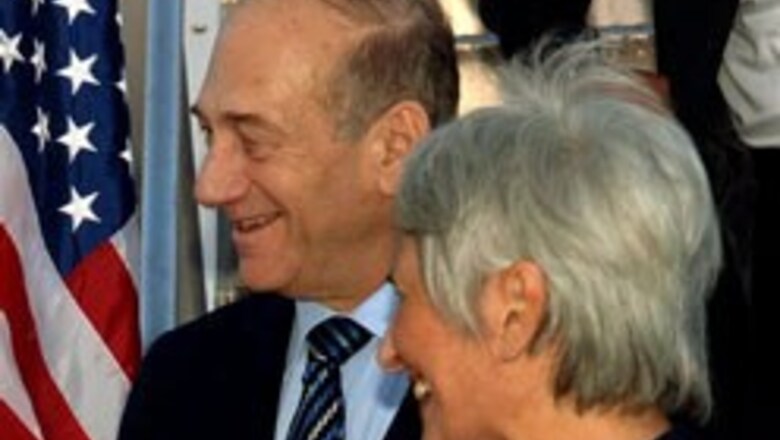
views
Washington:With formal peacemaking a dim prospect at this volatile time, Israeli Prime Minister Ehud Olmert intends to sound out US President George W Bush on the Israeli's plan to impose a West Bank settlement on the Palestinians by relinquishing most of the territory to them for a state.
Olmert might not get a conclusive answer from Bush in their meeting on Tuesday, but the Israeli leader is looking for clues on whether the president will insist that any plan to carve up the West Bank with the aim of establishing Israel's final borders requires the approval of Palestinian leaders.
Two years ago, Bush gave then-Prime Minister Ariel Sharon a green light to eventually absorb a handful of Jewish settlements near Jerusalem in the event of a peace accord.
But Bush's recognition of "facts on the ground", the settlements are solidly Jewish and virtually cities in size,was promptly qualified with US insistence that any territorial accord would require the approval of the Palestinian side.
On a fast-paced visit, Olmert had talks planned Tuesday with Secretary of Defense Donald H Rumsfeld.
On Wednesday he meets with Vice President Dick Cheney and House Speaker Dennis Hastert and speaks to a joint meeting of both chambers of Congress.
He had a private a dinner meeting on Monday with Secretary of State Condoleezza Rice and Stephen Hadley, the president's national security adviser.
A senior Israeli government official told The Associated Press that Israel would "be willing to go bilateral" if Abbas would start fulfilling pledges he made before the election.
"He said after the election he would dismantle the terrorist organisations," the official said.
A diplomatic official in Washington said Monday the administration is sending two of its top Middle East envoys, Assistant Secretary of State David Welch and Elliott Abrams of the National Security Council, to the region soon to gather information about Olmert's plans.
Olmert's meeting comes at a tumultuous time. Hamas has control of the Palestinian legislature and most of the rest of government, but its supporters fought pitched gun fights in Gaza City on Monday with backers of Palestinian President Mahmoud Abbas of the rival Fatah party.
Hamas is considered a terrorist group by the US and the European Union. It refuses to accept Israel's existence or renounce attacks on the Jewish state.
In a sign that Bush faces a rocky path at home, the House debated on Monday whether to impose sanctions that go further than what his administration has proposed. This includes a ban on assistance to the Palestinian Authority and on diplomatic contacts with Hamas, while also denying visas to its members.
PAGE_BREAK
The chief sponsor, Rep Ileana Ros-Lehtinen, R-Fla, said it would send a message to Hamas that the United States will not support a government run by terrorists.
Opponents said the legislation would restrict diplomacy with moderate Palestinians by prohibiting visas and travel for all members of the Authority and the Palestine Liberation Organisation.
Tony Snow, the White House spokesman, said he did not expect "anything formal" to emerge from the White House meeting.
The president and the prime minister "are going to be talking about ways to keep moving forward" with peacemaking, Snow said.
Similarly, Israeli ambassador Daniel Ayalon said "we must all examine different options to break the stalemate and all these issues will be discussed between Prime Minister Olmert and President Bush as a very good and trusted friend."
Ayalon said Israel faces a complex situation, with the election of Hamas, intransigence on the Palestinian side on stopping terror, and Hamas' refusal to recognize Israel and past agreements with the Palestinians.
Saying he has no negotiating partner on the Palestinian side, Olmert plans to impose his own terms over the next two years.
Sharon and Bush met a dozen times before the Israeli leader was debilitated by a stroke in January. They shared a distrust of the late Palestinian leader Yasser Arafat and agreed on a peace plan called the roadmap as a pathway to peace and a Palestinian state.
Bush has banned direct US aid to the Palestinian Authority. But with poverty rising among the Palestinian people, US assistance is on its way via UN and private groups, mostly for health programs.




















Comments
0 comment